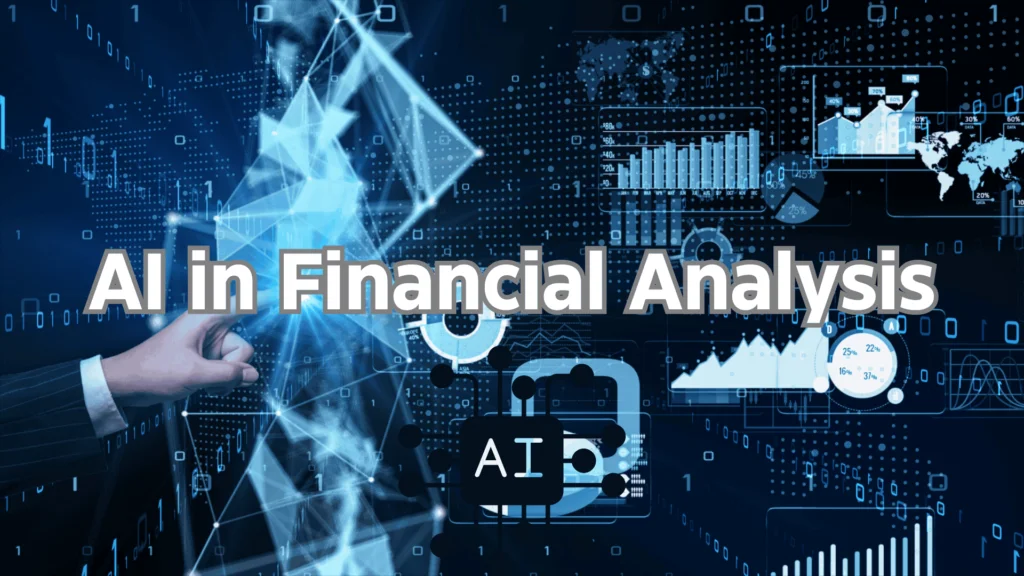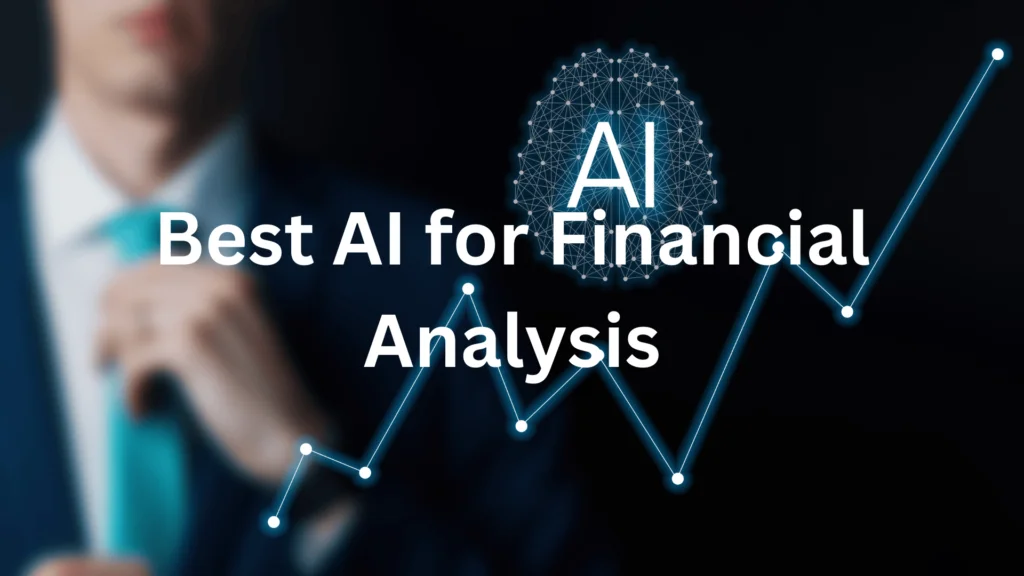Best AI for Financial Analysis: The Role of AI in Financial Analysis

AI in Financial Analysis: An Introduction
In this age of data wealth, the capacity to handle big data and process it instantaneously is a game-changer. Come into the picture best AI for financial analysis, a solution that has gained significant traction in the financial sector. With the advent of investment and risk management using AI techniques, the concept of Artificial Intelligence is gradually shifting from mere market hype to the framework of present-day business and finance. Here, we’ll discuss how best AI for financial analysis is useful and why it’s important for different businesses all across.
Transforming the Future of Finance: A Personal Approach
When we talk about the best AI for financial analysis, we are definitely not talking about one-tool-fits-all concepts. Today’s financial environment is very diverse and has its specific characteristics. So each company needs a unique solution to maximize the use of AI. To be effective in the sphere of finance, AI financial tools have to be customizable for precise tasks. This encompass forecasting, creating reports automatically, or improving choices.
For example, an AI platforms such as AlphaSense or Kensho is hailed. This is because they go through a plethora of financial data, analyze it, and output relevant insights in real-time. These are not just calculation AI financial tools. But they assist financial analysts in arriving at the right conclusions, thus enabling organizations to embrace new trends.
If you’re a small business looking for general AI tools to spruce up your brand image, you can learn more about such tools here.
AI Financial Reporting: Precision at Its Best
Another area that is undergoing a shift through the integration of Artificial Intelligence in finance is financial reporting. Financial reporting has historically been a manual-based exercise that is tedious and often accompanied by human inaccuracies. But, due to recent advancements in AI financial reporting, these procedures can be done automatically with the precision it requires.
AI financial tools can help in the analysis of financial reports, monitoring of compliance, and even forecasting. By applying artificial intelligence in preparing their financial statements, companies can prepare such statements much faster, more accurately, and cheaper. This change also improves the efficiency of the function and liberates finance professionals from time-consuming data filing and entry work.

AI in Corporate Finance: Redefining Strategy
AI in corporate finance has always been the game of having the right choices taken at the right times. The use of AI in corporate finance has helped firms make decisions based on available information. AI financial tools can accurately analyze market trends, appraise competitors’ financial health, and analyze the effect of further financial activities in real-time.
For instance, when it comes to the application of AI in M&A, the following is seen: Generally, the due diligence process in M&A transactions has always been a rigorous and time-consuming research effort. Nevertheless, AI tools for finance such as DueDil and DealCloud can help to facilitate this process. These tools utilize financial statements, market trends, and even sentiment analysis in social media for viewing potential deals.
Further, corporate finance is incorporating AI into the risk management framework, as it can detect financial risks and suggest measures to contain these risks before they worsen. What is more important with this approach to risk management is that it is proactive while financial markets are volatile and unpredictable.
AI in Financial Planning and Analysis: Future Is Here
FP&A is another area where AI has a great impact on the process. In the past, FP&A teams have used only historical data in order to make projections of future performance figures. Though useful, this approach has its drawbacks, especially in modulating various factors in the dynamics of the present-day economy. This is where AI in financial planning and analysis comes into the light.
Anaplan, Adaptive Insights, and other finance planning tools make it easier for businesses to build better, more responsive financial models. From a broader perspective, these models can include numerous factors starting with macroeconomics and ending with more industry specifics thus offering a much more rounded picture of the financial performance in the future.
In addition, AI in financial planning and analysis can also assist in the collection and analysis of data which are often time-consuming processes. These take up a lot of time in the FP&A process thereby releasing the time of the finance professionals to focus on core issues. It not only leads to saving much time but the reliability of the forecasts of the financial statements is boosted. To learn more about AI in business forecasting, learn more here.
AI Financial Tools: Empowering Finance Professionals
This trend of embedding AI in financial applications is perhaps one of the most encouraging phenomena for finance professionals recently. Self-service, automated tools, and rich data analysis, all these functions make changes in the traditionally built position of financial analysts. Data scientists are no longer restricted to merely computing numbers. Instead, they can explore meaning in data, design plans, and contribute to their enterprises.
For example, programs like Bloomberg Terminal or FactSet work as financial toolsets allowing finance personnel to analyze data in real time and make decisions more effective. These platforms use machine learning approaches to identify patterns, gain market insights, and, in some cases, provide investment advice, all with almost no human involvement.
Additionally, with the development of new technologies, such as machine learning, finance AI tools become more accessible to users who do not have deep knowledge about the technologies. It democratizes the essence of AI technology which implies that no firm is locked out of the enhanced insights that AI brings on the table.
The Human Touch: The Use of AI and The Role of Human Operators
It’s understandable that while AI has many benefits in financials, it doesn’t mean that the need for specialists is obsolete. The present state of best AI for financial analysis remains the best tools that enable decision-makers to make decisions. The last call has to be left to human beings since there are many issues that AI will never consider. These include ethical ones, and organizational culture among others.
Altogether, as AI emerges in their eventuality, finance professionals need to refresh their knowledge and improve their skills periodically. Understanding how to process past data from AI applications, determining the roles AI could play in business operations, and making actionable conclusions from AI insights will be equally important for maintaining a sustainable competitive advantage in the financial services field.
AI in Investment Strategies: Precisely designing the Future of Wealth Management
AI’s impact in the investment industry is making it feasible to achieve higher returns and providing users with individualistic ways of making investments. In the past, investments were made based on patterns belonging to a fixed past, emotions, and assumptions. However, with the use of AI, investment firms can now enjoy real-time data analysis, predictive modeling, and even automated trading. AI can examine big data to find trends and outlooks for future price changes. And consequently, rebalance the portfolio in response to the fluctuation of the market. With these advantages, it helps investors to gain high returns with low risk.
A notable example is robo-advisors, which includes Betterment and Wealthfront firms that work with artificial intelligence algorithms to invest for and rebalance client portfolios according to their risk tolerance measure and financial objectives. These AI based advisors can analyse market data as well as trade without human intervention thus expanding the market by cutting costs and eliminating the biases originated from sentiments such as greed and fear. Additionally, AI supported quantitative funds IT funds companies like two sigma and renaissance tools for high frequency trading and arbitrage.
AI investment platforms are also altering the aspect of wealth management since they also provide unique investment services. Looking at the investor’s income statement, cash flow, and risk appetite, then AI is capable of suggesting and proposing the right portfolio with respect to the investor’s objective and time. Such kind of targeting assists the investors to achieve high returns and reduce the possible risks of losses. Furthermore, AI can analyze the trends in the economy, the globe, and sentiment data. This is for investing purposes, enhancing wealth management’s ability even more.
AI in Fraud Detection and Security: Preserving Financial Credential
One of the most practical uses of AI is that it enhances security and fraud detection in the finance industry. With the ever-evolving threat environment, the question of real-time fraud detection remains a constant concern for the financial sector. AI advancements have greatly improved fraud detection by processing large amounts of transactional data and assessing risk levels.
AI algorithms basically are able to scrutinize hundreds of transactions per second, and they are built to identify such suspicious behavioral patterns when it comes to transaction for instance change in location of the holder, or very big transactions, or fluctuation of account activity. The AI for fraud detection that are used in machine learning such as the ones used by PayPal or JPMorgan Chase learn from new data that they receive and thus, their efficacy increases with time.
Another essential element of AI solution in fraud prevention is biometrics. Banks use AI for biometric authentication through facial recognition, fingerprint scanning, and voice recognition. Using biometric data and behavior data together, AI improves security for users and diminishes the usage of passwords that can be easily phished and hacked.
NLP is a part of AI that is also involved in safety since it can scan text conversations, including e-mail or chatting for traces of phishing or social engineering activity. AI-driven NLP tools assist institutions in preventing and flagging suspicious and malicious content before it reaches customers or employees.
The work of AI in preventing frauds and security has changed how financial industries protect their investments and client fidelity. Thus, AI remains a frontline of defense against financial fraud in the digital world, ensuring businesses and consumers are protected as the barriers of cybercrime are continually pushed.
Conclusion: Grasping the AI Revolution
The best AI for financial analysis is not a debatable topic, let alone a discussion on its usefulness. Artificial intelligence is quickly taking over the financial sector from accounting to corporate finance. Choosing the best AI for financial analysis can support companies to have a competitive advantage and become more financially successful.
Looking to the future, AI will remain one of the most significant drivers of the financial world’s evolution. The way forward for businesses is to acquire the right AI tools for finance so they can maximize their benefits. The future of finance is not about calculations, but intelligence, swift decision-making, and more importantly, being ready to lead in today’s world that is rapidly becoming more competitive.